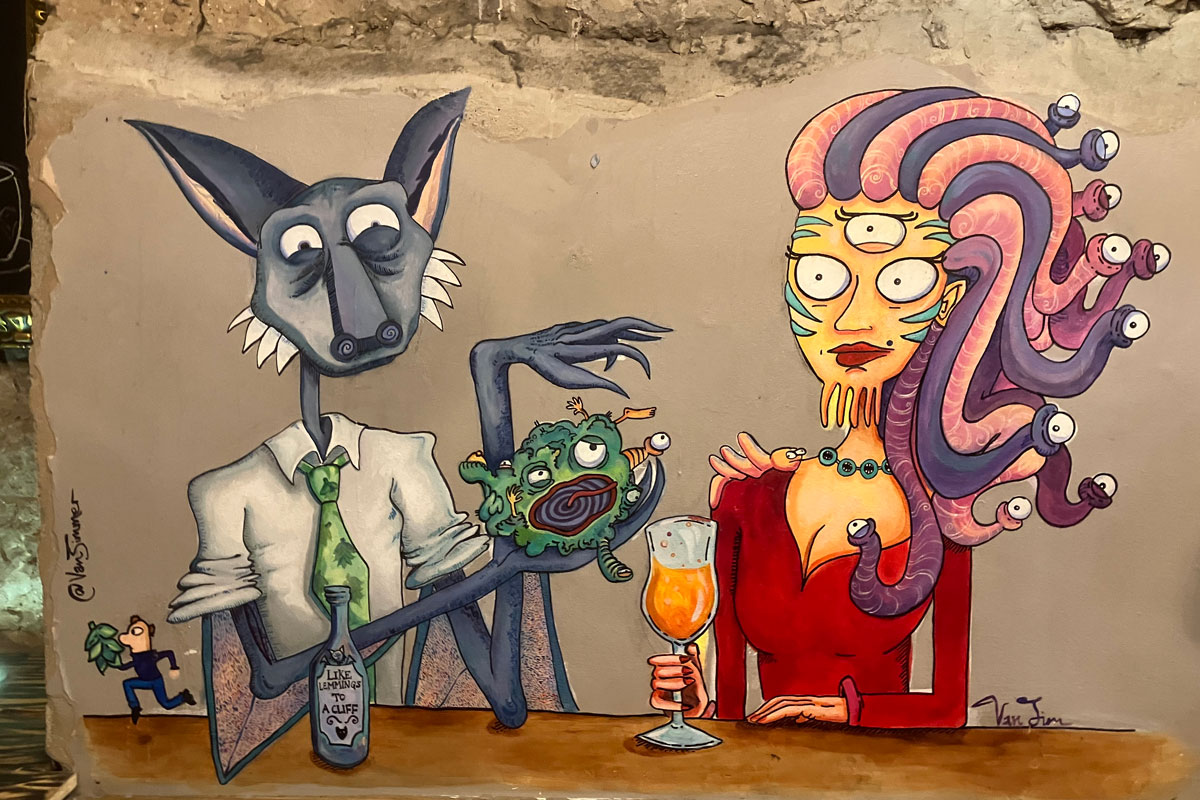
By Gordon Davidson
Although The Hanging Bat’s 11 years in business hardly register on Scotland’s grand scale of pub longevity, in terms of the craft beer boom, this hallowed Edinburgh ‘beer café’ is a veteran – as general manager Jamie Higgins puts it, ‘one of the oldest names on the hitlist’ of any beer enthusiast visiting the capital.
Occupying a prominent position on Lothian Road, just above the junction that can lead down to the Cowgate eastwards or Haymarket westwards, depending on your intentions for the night, The Bat retains a loyal clientele of beer enthusiasts, held in thrall by an offer unlike any other in the city, and perhaps unmatched anywhere else in the country.
Those regulars will thus have been unsurprised when The Hanging Bat clinched SLTN’s 2023 Craft Beer Bar of the Year award, presented in association with Camden Town Brewery.
There are no less than 23 taps on The Bat bar, 17 for keg and six for cask, pouring a constantly changing cavalcade of beers from far and wide. On any given day, IPA enthusiasts can choose from a Pale, a session, a fruit-led, then onwards into the Doubles and Triples. Sours are currently in vogue – an Edinburgh trend that Jamie reckons started with Pilot Brewery’s Peach Melba – and of course there’s always a black cohort of stouts, of varying ferocity.


Alongside the taps, The Bat normally keeps a range of ‘200 or so’ beers in cans and bottles, which Jamie buys in 12 or 24 packs, depending on strength and style.
This vast beer range has secured The Bat a relatively youthful demographic – at least from my point of view – of customers in their 20s to early 40s, albeit blurred at both ends of that age-scale by students and older craft beer fanatics.
A Caledonian Heritable property, the bar itself is decorated in a style best described as ‘hallucinatory’, with cartoon murals and spoof film posters, all loosely tied into the possibly-erroneous belief that the bar’s name was inspired by a line from gonzo journalist Hunter S Thompson’s ‘Fear and Loathing in Las Vegas’ – wherein intoxicated travellers realise that they’ve wandered into ‘bat country’.
(Other realities are available – it is also reported that the name arose after one of The Hanging Bat’s founders visited a brewery in Cumbria that was housed in an old barn, where there were some hanging bats.)
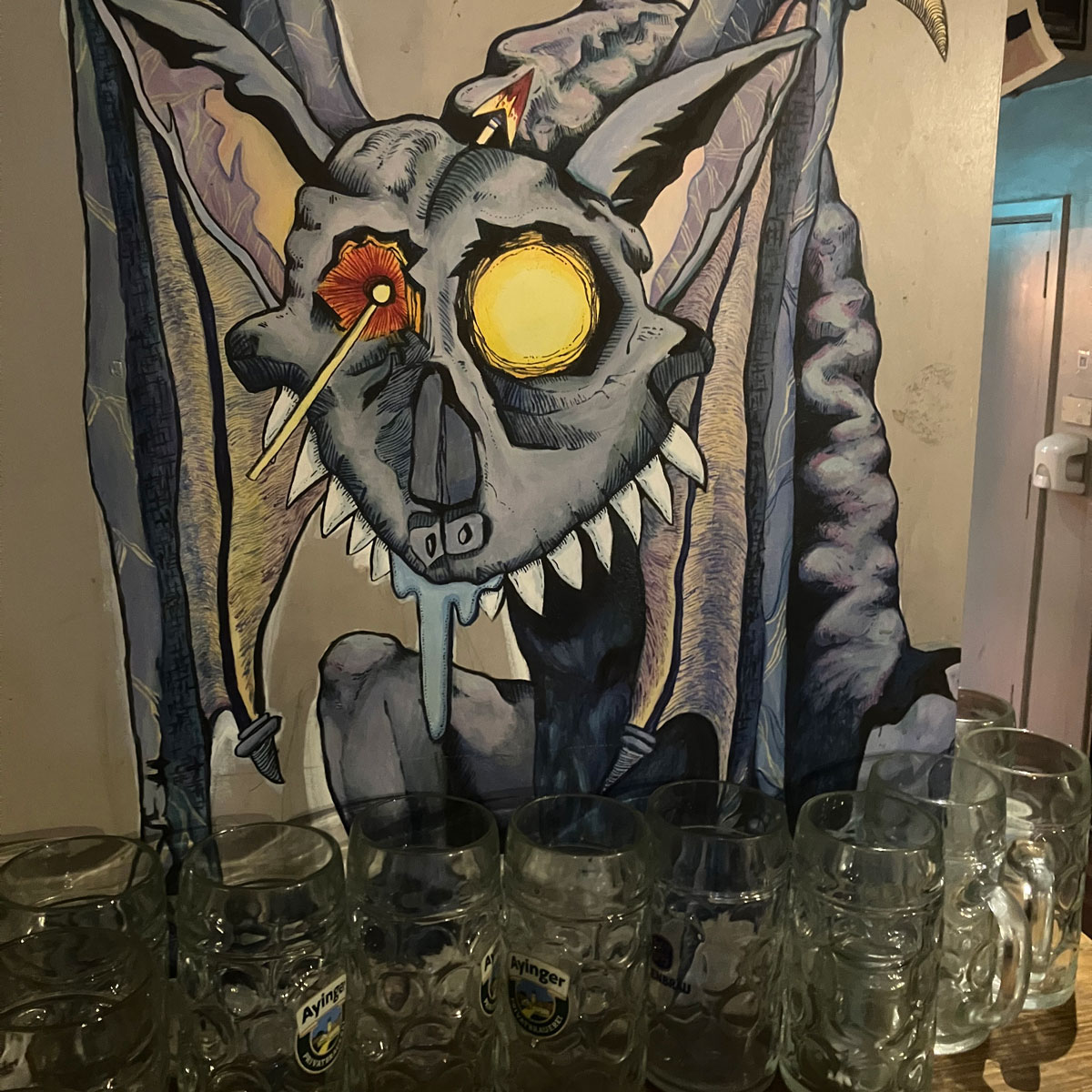

There are 60 seats around the tables scattered between the ground level, a mezzanine and a semi-basement snug sunk below that mezzanine. Add in the bar, and there’s maybe 70 seats in total. All told, the Bat has a comfortable capacity of 200, way below the floor-space max of 250. Despite its spot on a main drag, Jamie has never felt the need to employ security.
“The mix of people we get in is incredible – and it is all about the beer,” says Jamie. “A lot of our regulars are really focused on the beer and come back in every couple of days to see what is different.
“So the turnover at the bar is important to us, and keeping on top of what is on offer out there, and striking the right balance between established stuff and innovation.”
Alongside its regulars, The Hanging Bat gets a lot of beer tourists: “Once they’ve been round the newer Leith taprooms, they come in here to say hello.”
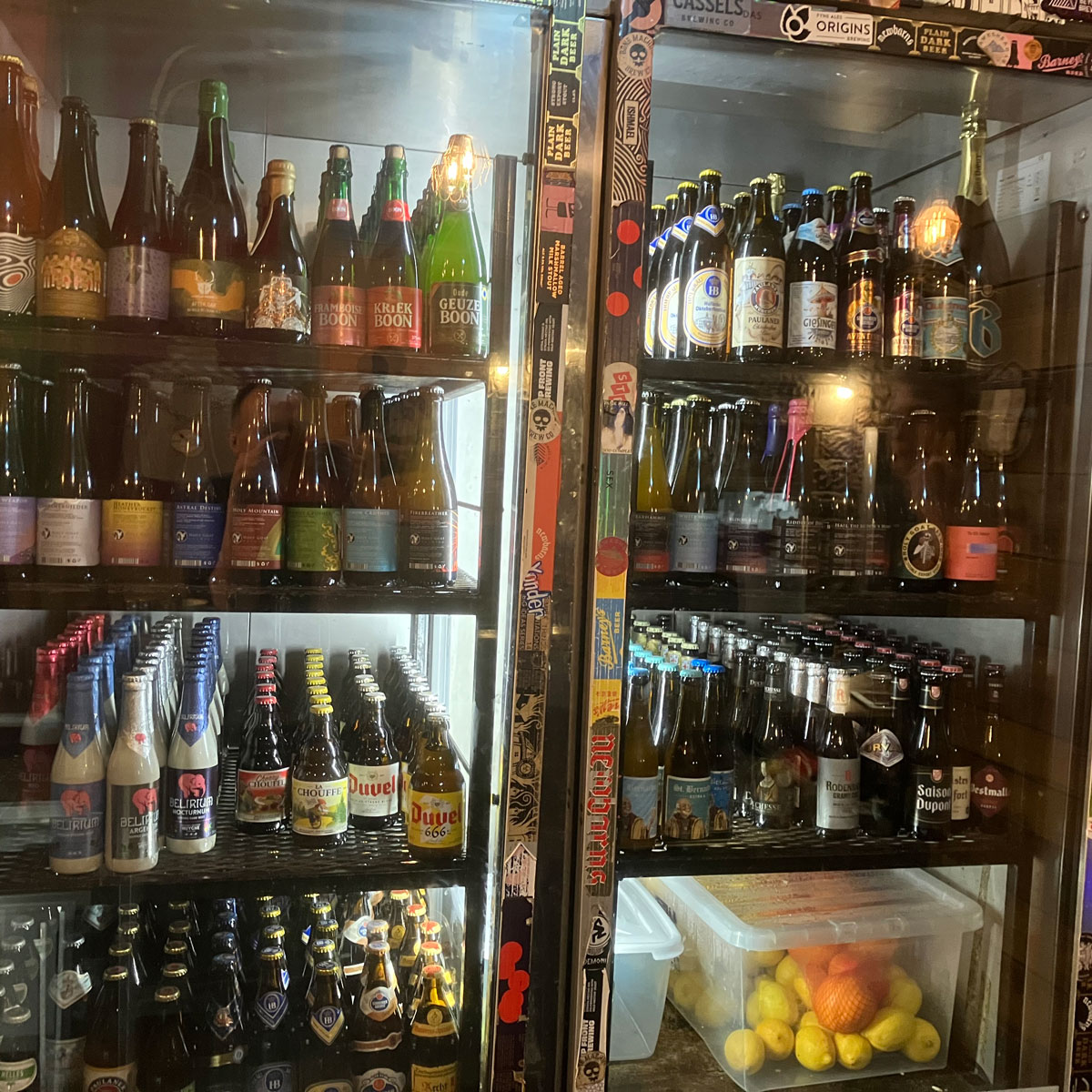

Another major driver of trade is the Untappd beer’n’bar rating app, which lets its many public subscribers know about new beers, returning favourites and brewing industry events, and thus encourages a lot of activity by triggering its users’ fear-of-missing-out.
“Every brewery, every beer they release, gets registered on Untappd – it is a huge thing.”
Jamie stresses that, while the Untappd app is free to customers, trade participants, whether they be brewers or bars, need to pay for their listing.
The Hanging Bat keeps a rota of 10 or so staff at any one time, covering its opening hours 12 til 12 through the week, and 12 til 1am Fridays and Saturdays.
Jamie admits that it is not an average bar job for new-starts: “It is tough coming in to 23 lines of beer and getting to know the nuances between different styles. Someone asks for a wheat beer, do they want a German wheat beer with notes of banana and clove, or a Belgian wheat beer, which has notes of orange and coriander? It takes a bit of time to acquire that knowledge.


“But it has been a good starting place for a lot of people within the industry. From bartenders to brewery operators, in all parts of the craft world, you’ll find our people popping up.”
Jamie’s first experience of the place was as a customer back in his student days, coming in on nights and days out circa 2016, 2017, 2018.
“The only thing that has changed is the prices,” observes the 25-year-old. Costs wise, Jamie reckons that the Bat costs the same to run as any other pub, in terms of staff and utilities – but when it comes to the core expenditure on its diverse beer range, it enters a whole other universe.
“We have to find the balance between buying in the big rotational selection of beers that our regulars expect – and often paying out the arse for it – and making sure that it’s still accessible for everyone.”
The Hanging Bat does carry ‘house’ beers, on the bar at their lowest price point, which is around £4 for a 380ml schooner serve. The house lager and stout currently come from Edinburgh’s own Campervan Brewery, in the shape of Leith Pils and Extra Black, while the house cider is Scotland’s own Thistly Cross.


Towards the top end of the pricing, the air can get quite rarified. As I visited, Jamie was working out how much they’d be selling a particularly premium 14.3% Swedish Imperial Marzipan Coffee Cream Stout that would be rolling into The Bat in a 20-litre barrel that had cost them £440.
Standard mark up on that would mean selling it at £27.90 per schooner – but he was inclined to knock that down to £22.50 per glass, to make it less daunting, albeit still very far from a budget beer.
“From mine and many others point of view, these types of beers are considered closer to something of a ‘finer wine’, which is why many can justify the price, including myself,” adds Jamie.
“If everyone knows that we have a crazy beer in, at a top-end price, but limited quantity and limited time, we will still sell it,” he says.
The Bat’s three main sources for its ever-changing cornucopia of beer are the EeBria Trade online marketplace – ‘Amazon for beer’ as it is known – and distributors New Wave, who specialise in Scotland and Northern England, and Kent-based Cave Direct.


Despite bringing in such a wide variety of beers, amongst which there must occasionally be one or two that simply are not the next big thing, Jamie reports that wastage isn’t an issue, as nothing goes unloved: “On any single day we will sell at least one from each tap, and the longest something might stay on if it is selling slower is two or three weeks.”
These lingerers tend to be the stronger Imperial Stouts and Triple IPAs, which keep well anyway. Jamie observed that some beers might even improve slightly during their stay, especially sour beers and those beers using more active strains of yeast.
Amidst all these liquid riches, I foolishly asked Jamie if he has settled on any particular favourites in his time at The Bat – to which he sensibly replies that he’s sampled ‘thousands and thousands’ of beers, and would really struggle to reduce that vast sensory experience down to a conveniently quotable top three, even if he wanted to, which he didn’t.
However, he’s more comfortable divulging which breweries find favour, as The Hanging Bat enjoys close relationships with many local craft beer-makers, often staging launch events with them. As such Campervan, Otherworlds, Overtone, Up Front, Vault City and Pilot are hardly ever out of the place. There’s also a special mention for Left Handed Giant, as one of its founders – Bruce Gray – was also a Bat founder.
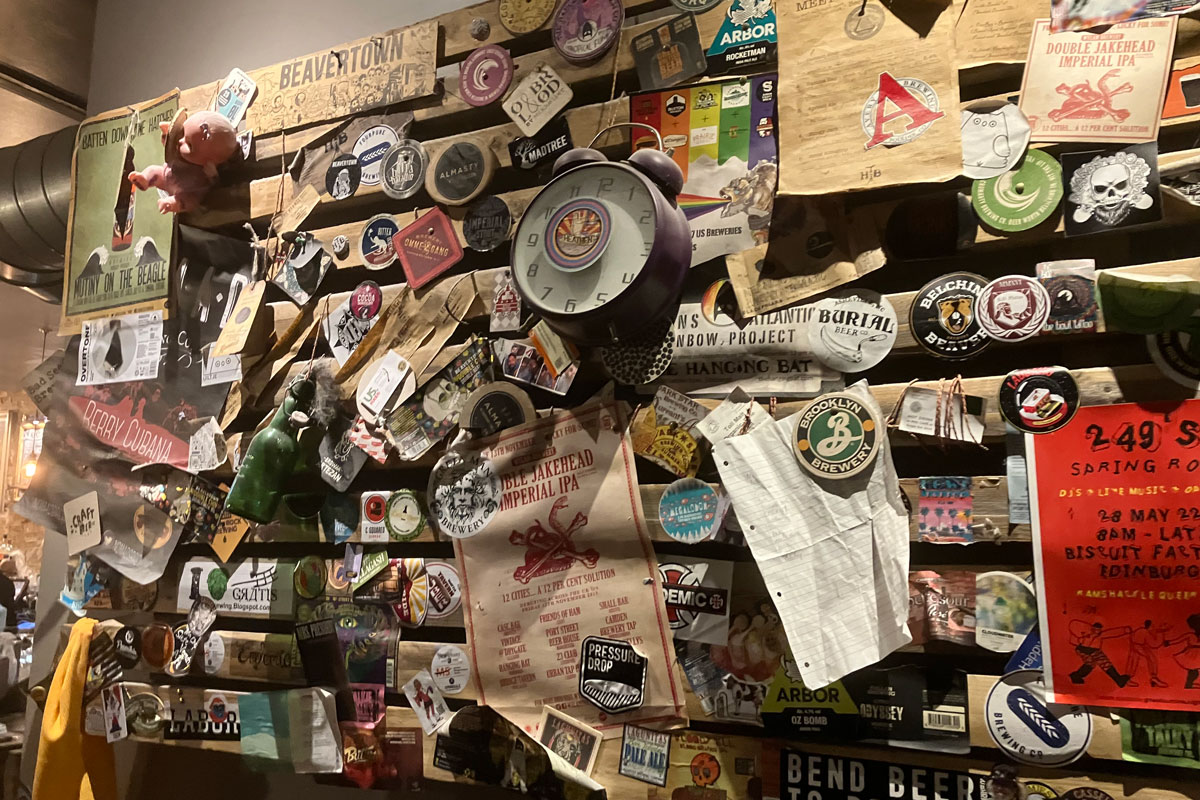

Jamie’s own bar career started at, of all places, Edinburgh Airport’s branch of JD Wetherspoon, where he’d had the honour of meeting mein host Tim Martin on several occasions.
“He’d just appear, then introduce himself to everyone in the bar,” recalls Jamie. “Then next time he came in, he’d remember everyone’s names. Every single one.”
So while we were on the topic, or thereabouts, I asked Jamie how Brexit was affecting the sourcing of specialist beers?
“Keg-wise, it is a lot harder to get stuff in from Europe – or at least, distributors might not want to even try, given the paperwork and costs,” he said.
“At the time, there was maybe an expectation that Brexit would create a ‘British beer for British people’ culture, but I think the opposite has been true. People are drinking more European beer than ever. Or at least, European-style beer, even if ultimately it is being brewed in England.”
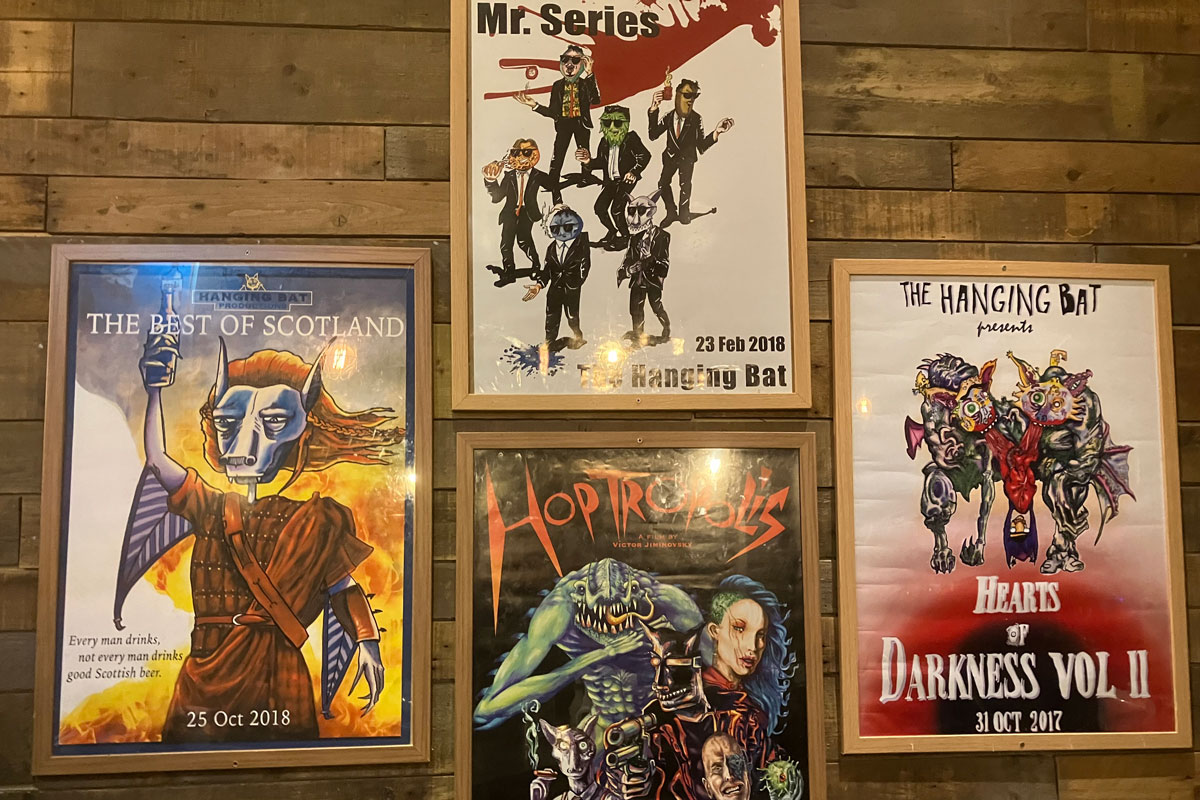

Perhaps surprisingly, cocktails are also a big part of the offer at The Bat, and right now constitute about 20% of its sales. There’s a menu of classic serves and specials, and the onus is on keeping that menu as cheap as is possible without compromising the quality.
“If you know it is being made well, with two shots of quality spirits, and you can afford to sell it at under a tenner, I don’t see why it has to cost as much as some places charge,” Jamie adds. “So we are not just beer wankers – we are cocktail wankers too.”
Did Dry January hurt, I ask him? “Nah,” he exhales. “But we did have a huge range of low-alc in for January, which was there for anyone doing that. Mash Gang in particular are making some incredible non-alc beers right now.
“Low-alc sours just fly out the door these days.”
One gets the feeling that The Hanging Bat is still pretty quick on its feet for the old kid on the craft beer block.
























